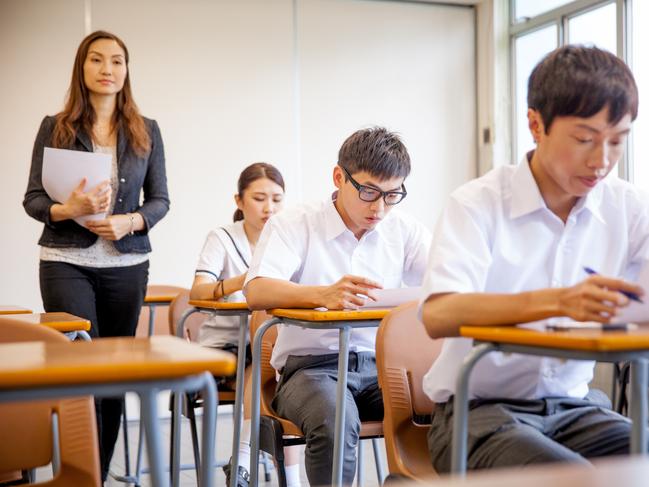NSW trainee teachers turn to tutors and AI to help them pass literacy and numeracy test
The proportion of trainee teachers failing an essential literacy test has nearly doubled since 2016, with NSW university students seeking out tutors and AI tools to help them pass. See if you can ace the test.

Tertiary
Don't miss out on the headlines from Tertiary. Followed categories will be added to My News.
The proportion of trainee teachers failing an essential literacy test has nearly doubled since 2016, with thousands of graduates unable to put basic punctuation in a sentence, new figures reveal.
The Literacy and Numeracy Test for Initial Teacher Education (LANTITE), which all graduate teachers across the country must pass before working in the classroom, now has a first-time fail rate of 10.4 per cent for literacy and 6.5 for per cent for numeracy.
It comes as university students undertaking teaching courses in NSW are seeking out tutors and even Artificial Intelligence (AI) tools to help them pass the test.
In 2016, the fail rate for literacy was 6.7 and for numeracy 7.6 for those who first sat the test.
This means thousands of students who want to teach in schools around the nation are unable to spell words such as exaggerate and disappointment or read a basic bar chart showing student results.
The figures are from 2023 – the latest available – when teachers were given three attempts to pass the test.
Even after they were given a year to improve and two more tries to pass, 7.5 per cent of graduates did not pass the literacy test and 4.7 per cent did not pass the numeracy test in 2023.
Teachers now have unlimited tries to pass LANTITE and can sit the test earlier in their degree in a bid to ensure those who can’t pass despite multiple attempts don’t waste four years and thousands of dollars studying teaching.
Australian Tutoring Association (ATA) chief executive Mohan Dhall said university students in NSW and other states were seeking the help of tutors and using AI tools to help pass the test.
“Some students are paying for AI tools and are using ChatGPT to help them practice for the test, but the quality of the test produced can undermine their learning,” Mr Dhall said.
“We should have people undertaking a literacy and numeracy test prior to them being made a university offer into an education course.

“It seems to me that the universities are effectively setting students up to fail and have a HECS debt by not vetting them earlier.”
NSW Secondary Principals Council president Denise Lofts said the council’s position was to support “quality approaches” for those gaining teaching qualifications.
“Any approach should be in line with ensuring that the barriers to becoming a teacher are supported, particularly as we try to reduce a teacher shortage,” Ms Lofts said.
Australian Catholic University’s national co-ordinator for the Graduate Teacher Performance Assessment and LANTITE Associate Professor Colette Alexander said most of the challenges faced by preservice teachers related to how the test was designed and administered.
“The questions are mixed up rather than progressively more complex,” she said.

A spokesperson for NSW Education Minister Prue Car said: “There have been a number of recent changes to the administration of LANTITE which mean Initial Teacher Education providers must ensure students sit the test in the first year of their degree, as well as providing better support for them to pass it.”
A NSW Education Standards Authority (NESA) spokesperson said: “Alongside robust literacy and numeracy standards, NSW maintains one of the strongest Initial Teacher Education (ITE) frameworks in the country to attract and develop the best and brightest teachers in classrooms.”




